I have recently relocated; teaching History in the United Arab Emirates. However, before my move overseas I taught at Elfed High School in Flintshire North Wales. I also went to school in Flintshire, Castell Alun. I don’t have a Welsh speaking background, as sadly my family and close friends are not Welsh speakers. However, I thoroughly enjoyed learning Welsh second language studying GCSE and A-Level. I then went onto study History at the University of Wales, Aberyswyth a place well known for its strong Welsh speaking community. The ability to speak Welsh was a skill that proved to be a great advantage during my job interview for the position at Elfed High School. Once I secured the job I was able to share my love of the Welsh language with both staff and students. I have also been the UK Ed Ambassador for Wales, hosting #UKEDchat and networking with teachers across Wales online. In 2014 I began the SSAT Lead Practitioner Programme, which I achieved in 2015. I had to focus on an area of whole school development that I could improve and show clear progress and impact. Bilingualism was the obvious choice. An obvious choice as it was one of my strengths but also an area that I recognised needed improvement. Bilingualism can be a very difficult area for schools as a whole to approach. Estyn defines bilingualism as:
“The ability to speak, read and write in two languages. In Wales, bilingualism relates to Welsh and English, as the official languages of Wales. When we inspect bilingualism, we look at learners’ achievement in Welsh and English and the extent to which providers promote and develop learners’ bilingual skills.”
There are many issues and problems facing schools in Wales in regards to bilingualism. These can include the ability of both staff and students, as this can vary considerably. Flintshire is on the border of North Wales so many teachers are from and based in Chester and had no experience or ability to speak Welsh whilst some had a basic grasp of the language and at the other end of the spectrum, there were some members of staff who were confident and fluent. This leads to an instant inconsistency and this will always be the case in schools across Wales. This can also be the case with students too. Their Welsh language skills can be influenced by external factors such as the area they live in, community and if their family speak Welsh or not and of course their attitude towards the language. Also, students who moved to the school from another school in England would automatically be at a disadvantage in regards to speaking Welsh. The attitude and mindset towards learning and speaking Welsh is crucial. Arguments I have heard against speaking Welsh can vary from ‘what’s the point?’ or its too difficult, Welsh isn’t needed and so on. Both adults and children can sometimes have this approach. Tackling bilingualism was a big challenge but within a year I was able to lead the whole school to achieve great success. There was a clear impact across the whole school that was also recognised by Estyn during the inspection week that took place in 2015.
I was very fortunate that the Head Teacher, Rosemary Jones is a fluent, capable and enthusiastic Welsh speaker as well as being very supportive and helpful. This helped me considerably and I believe if a member, or members, of SLT can speak Welsh then schools should fully take advantage of their expertise. However, I know not all Head Teachers and senior leaders across Wales are Welsh speakers. As bilingualism needs to be a whole school approach it is unfair to assume that the Welsh department should be solely responsible. Of course, the Welsh Department play an essential role as they are the in house experts and responsible for delivering the Welsh curriculum to students. A whole school policy needs a whole school approach. Here are the main strategies and techniques that I led throughout the year to promote bilingualism, with a lot of support from SLT, staff and students.
Skills Audit for staff
This is a fantastic starting point as it allows staff to be honest and open about their ability and confidence. It was quickly realised that staff would need different levels of support. The results of the audit, which was in the style of a brief questionnaire, allowed for future continuing professional development in regards to Welsh, to be differentiated to suit the individual needs of staff. The aim was to help staff progress and become able to use Welsh within their classroom confidently. Another result of the skills audit was a weekly morning briefing session held on a Thursday delivering Welsh lessons to all staff. I took on the group that I categorised as beginners and started with very basic classroom language and pronunciation. However, some staff had mastered the basics such as ‘Da iawn, Gwaith dosbarth’ etc and wanted to progress further. This was led by another member of staff who was an able Welsh speaker. Then finally there was a smaller group of very confident Welsh speakers who would spend sessions with the Head of Department for Welsh, learning about the more complex aspects of the language such as letter changes and mutations. I would often buy nice pastries and staff looked forward to their weekly 10-15 minute Welsh lesson every Thursday as we had great fun in these sessions for sample playing Bingo when learning the numbers in Welsh!

How can teachers with no ability to speak Welsh be expected to speak Welsh in their lessons with and in front of students if they have no training or support to do so?

Marking
Another result from the Skills audit highlighted teachers would find it difficult to mark written work using Welsh but recognised that it was an essential part of the marking policy. Issues that staff raised included concerns that they may use the wrong Welsh words or spell words incorrectly. A teacher asked me how much Welsh were they expected to include in their marking? I had previously been marking books with fully bilingual comments, all comments in English and Welsh. That was not sustainable, a work load issue and simply not necessary. I encouraged staff to include basic phrases in Welsh in their marking. All extended and detailed feedback should be in English, as the school is an English medium school, it is so important that all students can read and understand their feedback in order to progress. To address these issues a series of Welsh stickers were printed for all staff to use. They contained different phrases and the Welsh dragon. They could easily be stuck into books and students would recognise/understand the vocabulary. Marking in Welsh was no longer an issue. The stickers were kept in the staff room for staff to help themselves throughout the year, which they did. As all staff were using the stickers this led to consistency and students can use when completing peer assessment too.
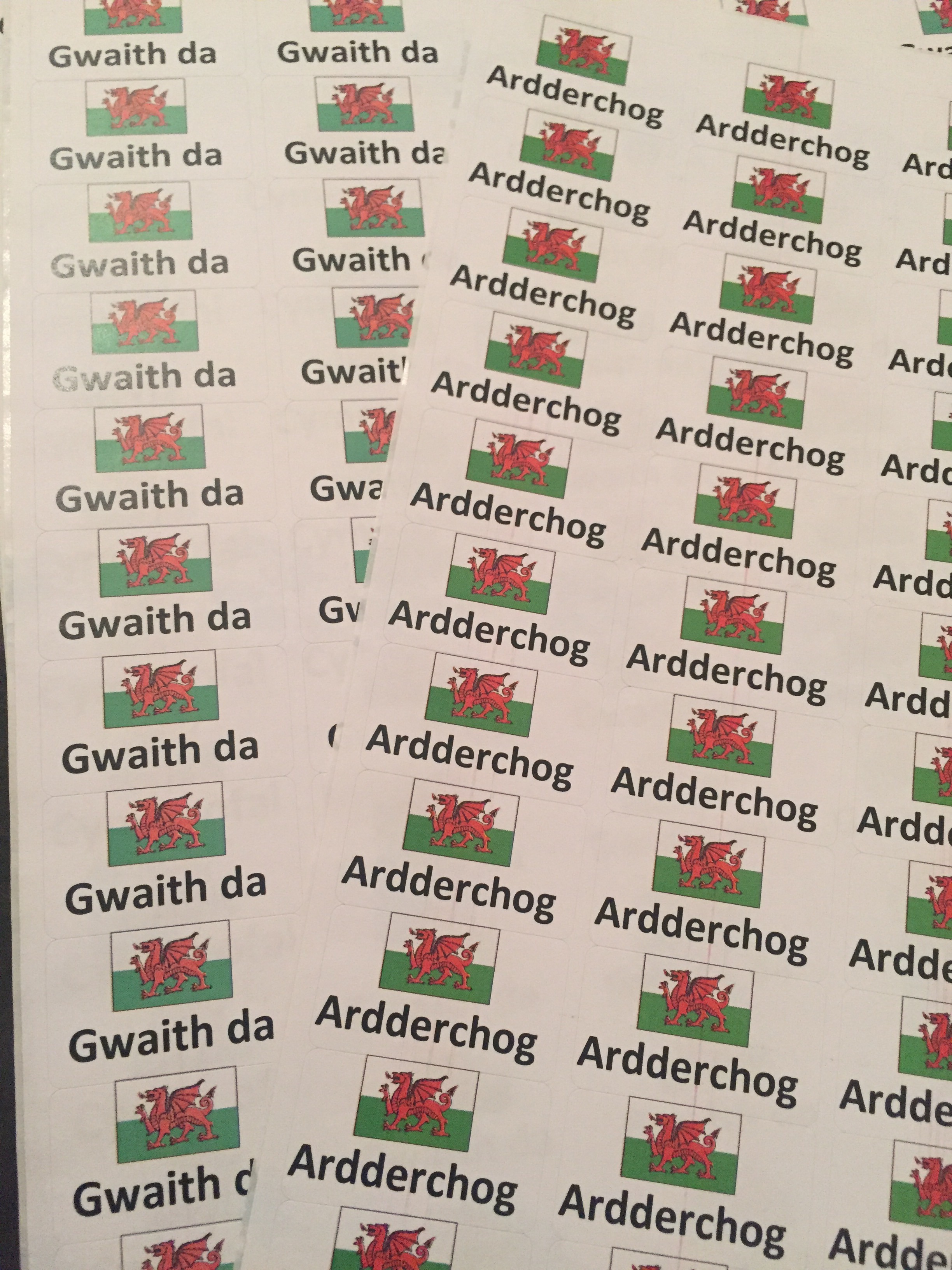
Displays
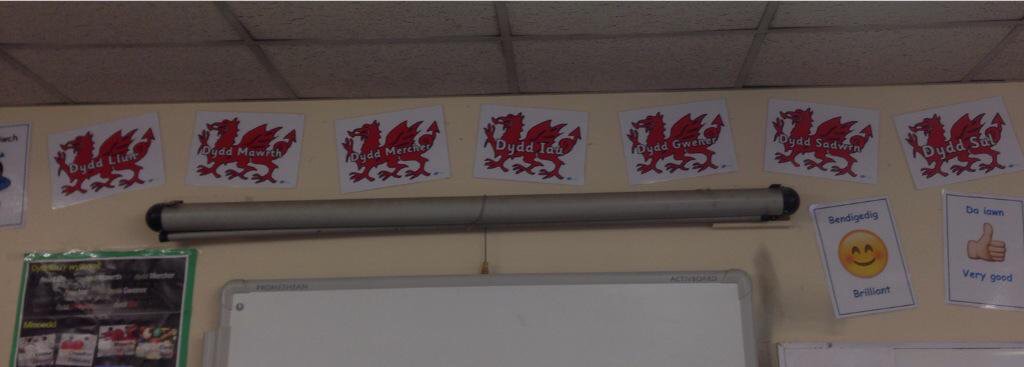
This is another area of bilingualism that can be consistent but isn’t. Every classroom in the school, regardless of the subject should show that it is a classroom in Wales and they are promoting the Welsh language and/or culture. This can be difficult for staff to create their own displays if they struggle with Welsh. I can recommend Twinkl as they share lots of great bilingual classroom displays for free that can be used in both Primary and Secondary. I created a folder with displays that could be put up which included the days of the week, months of the year and classroom language. These could be accessed by all staff and every student would go to a classroom with Welsh vocabulary on display to both support staff and students and highlight the importance of the language.
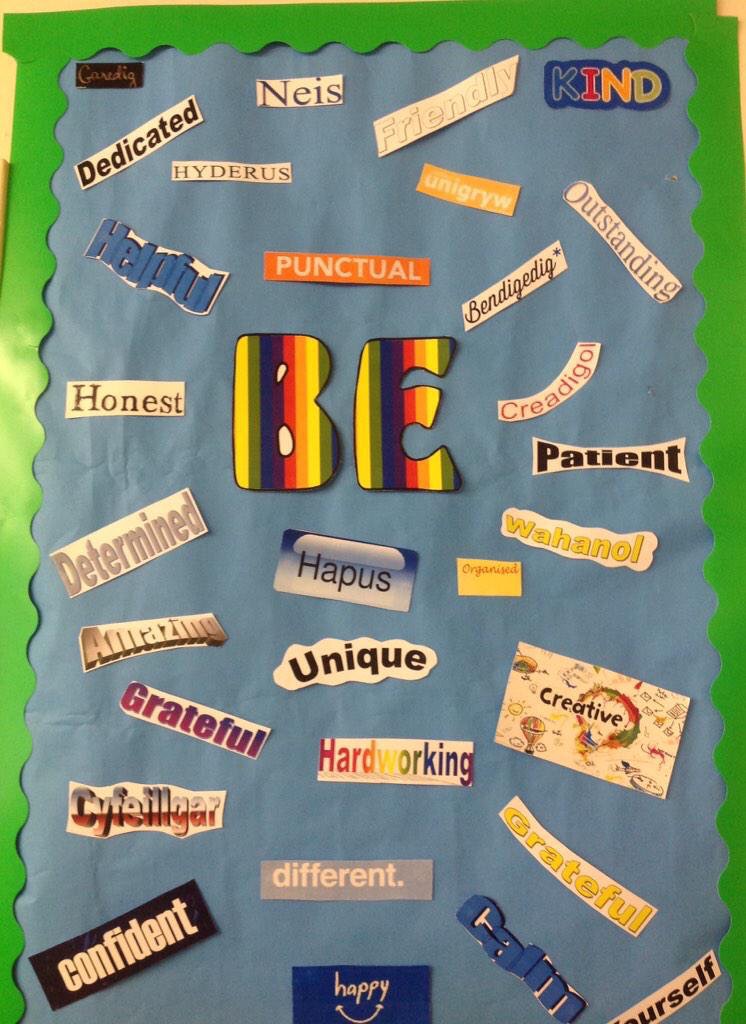
Developing the right mindset
I wanted to share my story with students how, despite not coming from a Welsh speaking background I was able to learn Welsh. I also wanted students to realise the value and importance of being able to speak Welsh. I held an assembly for all students and discussed some of my friends who can speak Welsh and how it has helped them in their careers from Solicitor, Teacher, Police officer to Actor. These were real examples, real people and how Welsh has helped them. An idea is to invite people to come into School to speak to students and explain how Welsh has helped them, as we know so many professions in Wales now require and demand basic Welsh language speaking skills. This can also lead to increased motivation at GCSE and NQT level too as they recognise the importance of the qualification. I created a Growth Mindset slide that I shared with students about overcoming difficulties with Welsh and to promote a positive mindset. Mark Anderson @ICTEvangelist adapted my idea to create the amazing graphic shown below. I encourage you to share this with staff and students at your school!

Sharing excellent practice
Although I am a teacher of Humanities I developed routines with all my classes that included Welsh such as taking the register, instructions, greetings etc. During lesson observations my use of Welsh was always noticed and commented on. Therefore I decided to informally invite any members of staff to observe a lesson or even just visit to see how I use Welsh. Some teachers did visit and found it a useful experience. I understood not all teachers would have the time to visit my classroom so I had sections of my lesson filmed, a History lesson where both myself and students were using incidental Welsh. This was available for all staff to watch and as they were only short sections, snippets of my lesson, they were there purely to help not add to work load. On inset training days the PE department, who are absolutely brilliant just full of energy and enthusiasm, organised some team building tasks and also used this as an opportunity to develop our Welsh language skills too. I also started creating bilingual teaching resources which I shared with colleagues and online for teachers across Wales to access. Again, bilingualism shouldn’t add to work load so another suggestion is looking online to see what is already available, through my research I found several useful websites and resources. I also visited a local feeder Primary school, Mountain Lane. I was so impressed with the level of Welsh being used by both staff and students! I realised this needed to be continued at Secondary School, students should continue to progress not become more reluctant to use their Welsh. The school insisted that if students wanted to go to the toilet they had to ask in Welsh. If students were able to do this in Primary then they should carry on with this practice in Secondary. I returned to my school with lots of feedback and insight about how bilingualism was embedded in our feeder schools so we could act on this information.

How do you measure the success of bilingualism?
In order to achieve my Lead Practitioner status I had to prove my research and work had been successful. I knew it had been successful because bilingualism was evident through displays all around school, Welsh stickers in students books and most importantly hearing staff and students regularly use incidental Welsh every day in lessons and around school in the corridors etc. I also asked staff to complete another audit at the end of the academic year to provide feedback and further steps for improvement. As a whole staff felt much more confident and had benefited from the extra time and support provided. I also asked students to complete a questionnaire to listen to learner voice and their views about bilingualism, which were generally very positive. During the Estyn inspection week the Head Teacher, Head of Welsh and myself met with an Estyn inspector to discuss bilingualism and all of the inspectors had commented on the noticeable use of Welsh around school. Elfed High School was rated as ‘Excellent’ by Estyn in both categories in 2015. The Estyn inspection report can be found here. There are also other examples of best practice that can be found on the Estyn website.

So finally, my top tips in regards to bilingualism…
* This must be a whole school approach.
* There will always be inconsistencies but try to develop consistency when possible.
* Give staff time, support and encouragement to develop their Welsh. This could be time dedicated during morning briefing, departmental meetings or inset days.
* As a School promote a positive and growth mindset towards the language and culture.
* In regards to marking and displays- keep it simple and consistent.
* Ensure there is a space to share all resources, practice etc either on the school network or in the staff room so it is accessible for all.
* Have fun sharing, learning and promoting such a beautiful language!
Thanks for taking the time to read my post, diolch fawr iawn! If you have tried any of the ideas and suggestions in your school, I would love to hear your feedback. Although I am now teaching internationally I am very keen to keep up to date and stay connected with education in Wales. I will try to speak Welsh at any opportunity I can, because if you don’t use you it then you lose it! You can get in touch using the contact page or drop me a message on Twitter.


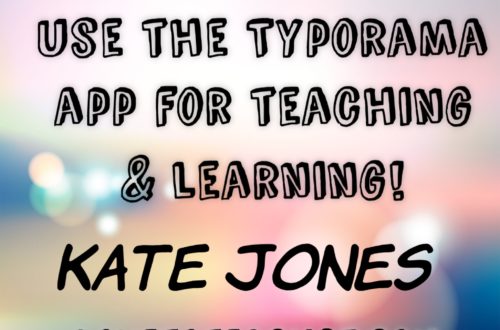
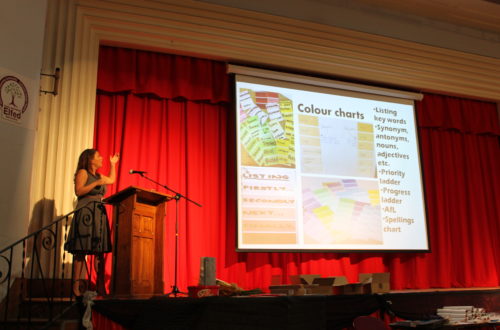
barringtonjmock says:
Reblogged this on Y Byd a'r Betws – Blog B J Mock and commented:
Datblygu Dwyieithrwydd.
barringtonjmock says:
Defnyddiol iawn. Diolch yn fawr. Syniad arall ydy datblygu cyrsiau bach gyda iaith achlysurol yn defnyddio Memrise ac mae Duolingo Cymraeg yn ardderchog achos mae’n dilyn y cwrs i Oedolion. #hyder 🙂
Meryl Hendry says:
Diddorol I ddarllen eich adroddiad.
Mae popeth I chi wedi cyflwyno yn iawn ac yn gweithio ond dydy’ staff ax ysgolion ddim yn cadw fe lan.
Mae’n a os nag yw uwch dim ddim yn gefnogol.
Nick says:
I found your article interesting. I wish to present a deeply disturbing side to the bilingual policy in Wales and gain your thoughts.
Like you, I was born n Wales and after many years overseas, wish to return to Wales but I now find I am an exile due to my lack of Welsh.
My 6-year old son cannot attend the school closest to him because
although his Spanish, Chinese, Thai and English are pretty good- he doesn’t speak Welsh and so to send him to the convenient and local Welsh Medium school down the road would be to immerse him at the expense of his education.
My second challenge and one that solves your concern about English only speakers is that when I considered making an application for a HoD job I was hugely disappointed to see in the ESSENTIAL criteria, that the candidate must speak Welsh. Even with a PhD, PGCE and 2 x MA’s I became unemployable.
My third point which makes me truly wonder what is wrong with our government and the Welsh Assembly is: How can one possibly promote bilingualism in an all
all Welsh speaking school in an all Welsh speaking town? Bearing in mind as far as I am aware, English is the language of inclusion for the United Kingdom.
I am absolutely supportive of bilingual Wales (although speaking as a linguist Welsh was dying out 30 years ago until vast amounts of money were applied to resuscitate it) That will be gone with Brexit, but what upsets me is the exclisionism of the policies.
And my family are now excluded from returning to Wales. Solely due to my lack of ability to speak Welsh. Some will think this is my problem, I should go and acquire the Welsh language which I am happy to do but the reality is if we prepare students as monolingual Welsh speaking g students which appears to be a very viable option, how are we really preparing them for employ,met in a pluralistic society in a country that is 2nd poorest to Lithuania?
This is not a bitter rant – I genuinely am interested in your response and anyone elsee on this blog. All schools in Wales offer good options but for me a Welsh only school is a poorly considered option tha does not have the students bets interests at heart.
With thanks.
Ucationql option .
Nick says:
Sorry for all the typos. No edit option.
Kate Jones says:
Thanks for your feedback. Interesting but what you write is very different from my experience in Wales. It was desirable to be able to speak Welsh but not essential. Perhaps, different areas across Wales vary in this but I know many teachers across Wales who are not fluent Welsh speakers.